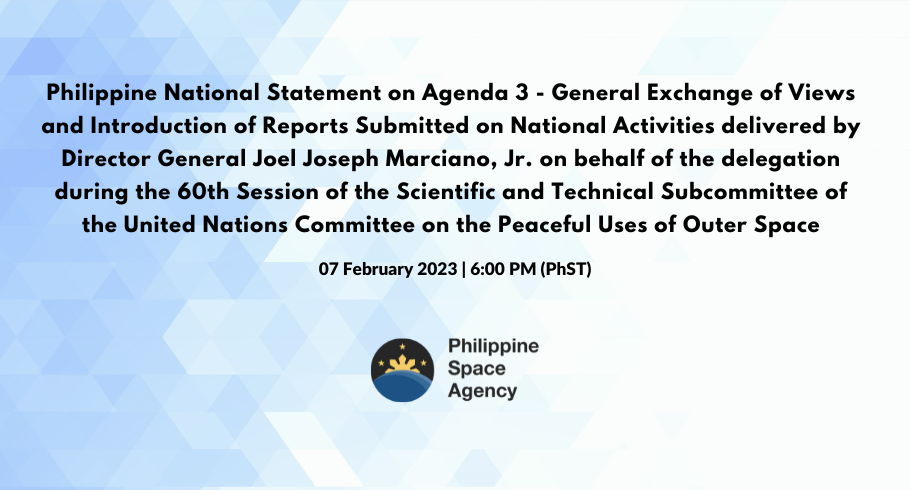60th SESSION OF THE SCIENTIFIC AND TECHNICAL SUBCOMMITTEE OF THE UNITED NATIONS COMMITTEE ON THE PEACEFUL USES OF OUTER SPACE
PHILIPPINE NATIONAL STATEMENT
AGENDA ITEM NO. 3 “GENERAL EXCHANGE OF VIEWS AND INTRODUCTION OF REPORTS SUBMITTED ON NATIONAL ACTIVITIES”
delivered by
DR. JOEL JOSEPH MARCIANO, JR.
DIRECTOR GENERAL
PHILIPPINE SPACE AGENCY (PhilSA)
Thank you, Mr. Chair.
The Philippines extends its appreciation to you, Mister Chair, and to the dedicated staff at the United Nations Office for Outer Space Affairs (UNOOSA), for the successful conduct of the 59th Session of the Scientific and Technical Sub-Committee (STSC) of the United Nations Committee on the Peaceful Uses of Outer Space (UN COPUOS) last year. Please be assured of my delegation’s full cooperation and active participation in the 60th Session of the STSC.
On behalf of the Philippine delegation, I would like to commend you, Mr. Chair, for the work done for the last two years of your leadership. And, we welcome Guatemala and Uzbekistan as new members of the Committee and we look forward to working with them. We also express our sympathies to the victims affected by the earthquake in Türkiye and Syria.
Mr. Chair and distinguished delegates,
The country’s new leadership provides a stronger pronouncement of the Philippines’ vision and direction with respect to space science and technology applications, which is enshrined in the recently approved Philippine Development Plan for 2023 to 2028. It is framed under the Administration’s 8 point Socioeconomic Agenda and seeks to address both short-term issues and medium-term constraints to growth and inclusion towards a prosperous, inclusive, and resilient Philippine society.
The Philippine Development Plan highlights the Philippine science, technology innovation foresight with the main goal of charting a strategic path by anticipating the factors that will influence the development of the Philippines’ scientific capital in the years leading up to 2050. Space Exploration is included as one of the core science, technology and innovation foresight key operational areas.
Mr. Chair,
It is also my privilege to inform you that three (3) of our nanosatellites have completed their mission last year. Maya-2, the country’s second nanosatellite, ended its mission on 05 July 2022, while Maya-3 and Maya-4, the first nanosatellites built in a university program in the Philippines, concluded its mission on 04 August 2022. Both Maya-3 and Maya-4 were able to transmit Automatic Packet Reporting System (APRS) beacons to ten (10) countries on various occasions. The CubeSats were also successfully used by different amateur radio operators from eight (8) countries. Another set of CubeSats – Maya-5 and Maya-6 – are currently under development by Filipino graduate students at the University of the Philippines. This project aims to locally extend and build on the knowledge and skills in satellite development acquired from overseas immersion. The Philippine Space Agency is also embarking on the development of a 130kg small satellite for Earth observation – the Multispectral Unit for Land Assessment or MULA – with a primary mission aimed at monitoring agriculture and supporting food security. MULA is expected to be launched into orbit and commence operations in 2025.
Mr. Chair,
Recalling the statement delivered by the President of the Philippines, His Excellency Ferdinand R. Marcos, Jr. during the 77th UN General Assembly High-Level General Debate on 21 September 2022, he conveyed the Philippines desire to expand its presence in outer space.
To quote, “The Philippines is preparing for the future by laying the governance framework that will allow us to harness the power of renewable energy, develop the capacity to utilize the life sciences such as medicine and virology, pursue digital solutions towards a more modern economy, and expand our presence in outer space.” He added that “We need to start by defining the norms of responsible behavior in cyberspace and outer space and forming legal rules that will prevent the weaponization of artificial intelligence.”
We acknowledge that the work ahead will be challenging for an emerging space nation like the Philippines. However, with strong collaboration with partners, especially industries, we will not only overcome, but will reach farther. With stable macroeconomic fundamentals that will reinforce growth momentum and continuity, the Philippines looks positively for a more robust economic development supported by a vibrant local space ecosystem and international cooperation.
Mr. Chair,
As the Philippines attempts to strengthen and expand its bilateral and multilateral relations in pursuit of maximizing our opportunities and potentials, the country recognizes its role in promoting the use of space data. We have set our sights on the space data value chain where we commit ourselves to cross the chasm from insights to action, such as when satellite images and space-borne data are used to prepare for and respond to disasters, address the intensifying adverse effects of climate change, and strengthen environmental protection in the country. Only when such insights are acted on effectively can socio-economic value and benefit be realized. These efforts will be further elaborated in our country statements on remote sensing and long term sustainability of the outer space activities, as well as in the technical presentations to be delivered by the Philippine Delegation.
In closing, Mr. Chair, by laying down the work in building our space capabilities, the Philippines intends to contribute to the responsible and sustainable progress of outer space activities, and achieve the goal of inclusive socio-economic development for our people.
Thank you, Mr. Chair.




